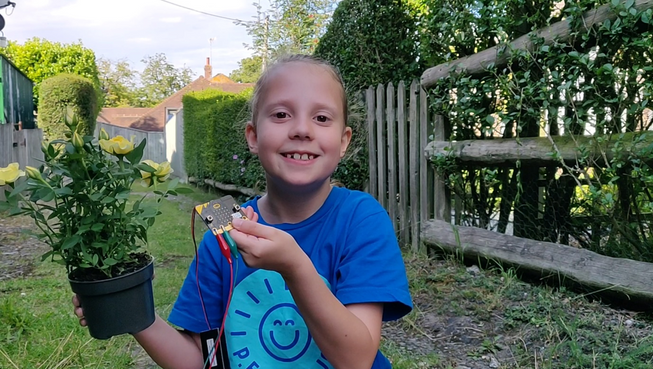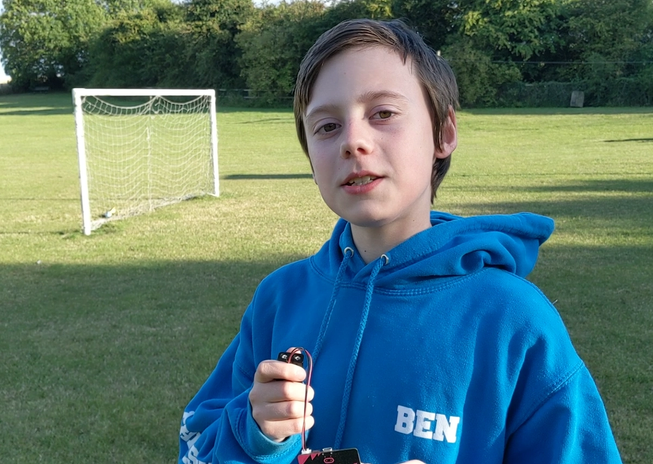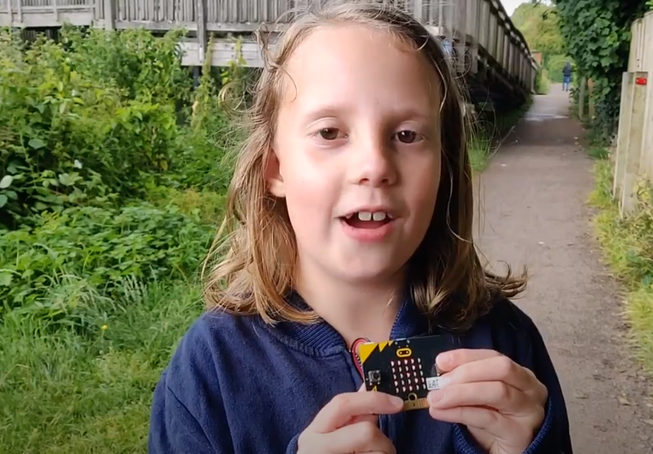Remote summer school
Kids learn outdoors at a micro:bit summer school in West Berkshire, England

A child proudly shows her micro:bit project she programmed during the summer school
Covid-19 and ensuing lockdown proved very challenging for us all, especially children. Many students missed out on large parts of their education, including the usual transition activities for those moving to from primary to secondary school.
However, one creative computing teacher based in West Berkshire, England, devised an innovative way of using the BBC micro:bit to help children develop their coding and computational thinking skills and at the same time help them get ready for secondary school.
The idea of a remote micro:bit summer school

This summer school aimed to support transition into secondary, missed by primary students during Covid-19.

Peter Marshman, the lead for the Teach Computing Berkshire & Hampshire Hub at Park House School and Community Outreach Manager for Computing at School, realised that there was an opportunity to help Year 6 children (aged 10-11) by devising and delivering a remote summer school using the micro:bit.
Peter’s idea was that the summer school would help children to develop their coding and computational thinking skills indoors, then take their device outdoors to explore nature and keep fit, to help them make the most of lockdown restrictions being lifted during the school holidays.

Kids enjoyed programming the micro:bit and taking it outside
Making it happen
Peter set up a collaboration between Park House School and West Berkshire Council Education Service and engaged three secondary school computing teachers to help. BBC micro:bits were sent out in the post to 95 children from 43 schools across West Berkshire and beyond.
The team provided six sessions of live webinars and online tuition for two weeks in August, giving remote support to the children, helping them to learn how to program their micro:bits and encouraging them to share their own creations.
The summer school activities
Peter chose and adapted six activities from the micro:bit website that would get children creating devices to use outside to enjoy nature and keep fit. Resources were created for the project and a dedicated website set up at https://www.parkhousehub.org/summerschool.
During the summer school the children were able to create:
- A step counter
- A digital pet
- A species counter
- A beep test
- A workout organiser
- A plant moisture monitor
Why choose the BBC micro:bit?
Using the micro:bit was an easy choice for Peter for the summer school for a number of reasons:
"The micro:bit is a low-cost device that is easily transportable to children without damage, which meant we could send 95 micro:bits out to families. The integrated sensors and output devices means the focus is on coding, rather than complicated set up."
In addition, Peter felt the focus on transition between primary and secondary school made the micro:bit the perfect fit:
"The simulator provides children with a demonstration of what their code will run like without having to download and test first, increasing the time spent on developing their ideas and less time on troubleshooting."

The species counter is a popular micro:bit project with children
The children involved
In total 95 children from 85 families and 46 different schools were involved in the summer school. Of the children involved, 38% said they qualified for free school meals and 41% were girls.

I can’t wait to do some more coding!

The summer school was very popular with children and families alike and 85% said they would like to attend next year. One child said “It was really fun… I can’t wait to do some more coding!”
Future plans
Peter is already planning to build on the success of this year’s summer school in 2021 and hopes to roll it out beyond West Berkshire to a national project. He said "This was somewhat of an experiment, to adapt to changing circumstances, to ensure that children didn’t completely miss out on their Computing education and transition to secondary school."
"The remote summer school had such a positive impact on those who attended and we were overwhelmed with the number of schools that took part. For all those who took part, there are many more who missed out and I’m hoping that through sponsorship this scalable project can reach more children across the UK next year." - Peter Marshman, Community Outreach Manager, Computing at School